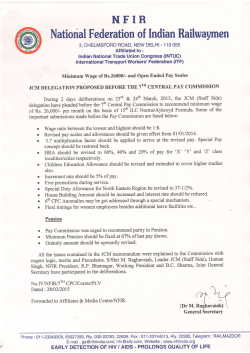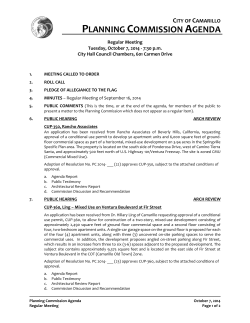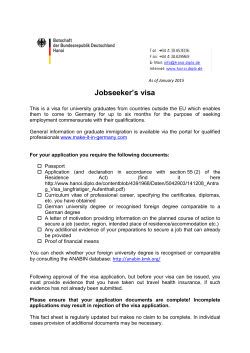
SJUSA complaint
In the United States District Court for the District of Columbia Save Jobs USA 31300 Arabasca Circle Temecula CA 92592 Plaintiff, v. Civil Action No. 1:15-cv-615 U.S. Dep’t of Homeland Security; Office of General Counsel Washington, DC 20258 Defendant. COMPLAINT FOR DECLARATORY AND INJUNCTIVE RELIEF 1 Complaint Plaintiff Save Jobs USA (“Save Jobs USA”) brings this complaint against the United States Department of Homeland Security and states: 1. This case arises under the Administrative Procedure Act (“APA”), 5 U.S.C. § 551; and the Declaratory Judgment Act, 28 U.S.C. § 2201 et seq. 2. Save Jobs USA hereby challenges a regulation recently promulgated by the United States Department of Homeland Security (“DHS”) that grants work authorization to certain H-1B dependent spouse aliens who possess H-4 visas. 3. The regulation at issue is the Employment Authorization for Certain H4 Dependent Spouses, 80 Fed. Reg., 10,284 (Feb. 25, 2015) (codified at 8 C.F.R. parts 214 and 274a) (the “H-4 Rule”). 4. According to DHS, the H-4 Rule will add as many as 179,600 new foreign workers in the first year and 55,000 annually in subsequent years. 80 Fed. Reg. 10,285. 5. The H-4 Rule is in excess of DHS authority and directly contradicts several provisions of the Immigration and Nationality Act (“INA”) of 1952, as amended, including, 8 U.S.C. §§ 1101(a)(15)(H), 1182(a)(5)(A), 1182(n), 1184(g). Jurisdiction and Venue 6. Jurisdiction of the Court is based upon 28 U.S.C. § 1331 (federal question); 28 U.S.C. § 1346 (United States defendant); 8 U.S.C. 1329; the Declaratory Judgment Act, 28 U.S.C. §§ 2201 et seq. (declaratory and injunctive relief); and the Administrative Procedure Act, 5 U.S.C. §§ 702 et seq. 7. Venue is properly vested in this Court as the Defendant is located in Washington, D.C. Venue is also proper within this judicial district pursuant to 28 U.S.C. § 1391. 2 Parties 8. Plaintiff Save Jobs USA is an unincorporated group of computer workers formed by Americans who were employed at Southern California Edison (“SCE”) until they were replaced by foreign workers imported on H1B guest worker visas. They formed Save Jobs USA to address the problems American workers face from foreign labor entering the United States job market through visa programs. 9. Save Jobs USA members are direct economic competitors with H-1B workers. As a result of DHS’ H-4 Rule that will be effective May 26, 2015, Save Jobs USA members are economic competitors with H-4 visa holders as well. 10. Defendant DHS is the parent agency for the United States Citizenship and Immigration Services (“USCIS”) and the U.S Immigration and Customs Enforcement (“ICE”). DHS, USCIS and ICE are the source of the administrative actions challenged in this lawsuit. The Structure of the Immigration System 11. Aliens are admitted to the United States as immigrants, nonimmigrants, or refugees. 12. Congress has defined various categories of non-immigrant admission and their purposes. 8 U.S.C. § 1101(a)(15). Such purposes include visitors, to perform labor, and students. 13. The name of a non-immigrant visa is derived from its location in § 1101(a)(15). E.g., the “A” diplomat visa is authorized in § 1101(a)(15)(A); the F-1 student visa is authorized at § 1101(a)(15)(F)(i). 14. The H-1B guest worker visa authorizes admission, “subject to section 1182 (j)(2) [requiring doctors to be certified] of this title, who is coming temporarily to the United States to perform services … in a specialty oc- 3 cupation described in section 1184 (i)(1) of this title or as a fashion model, who meets the requirements for the occupation specified in section 1184 (i)(2) of this title or, in the case of a fashion model, is of distinguished merit and ability, and with respect to whom the Secretary of Labor determines and certifies to the Attorney General that the intending employer has filed with the Secretary an application under section 1182 (n)(1) of this title.” 8 U.S.C. § 1101(a)(15)(H)(i)(b). 15. The H-4 visa authorizes admission to an “alien spouse and minor children of any such alien specified in this paragraph if accompanying him or following to join [an H alien guestworker]”, 8 U.S.C. § 1101(a)(15)(h). 16. Congress has authorized dependents who possess certain nonimmigrant visas to work. 8 U.S.C. §§ 1184(c)(2)(E), (e)(6). However, it has not included aliens who possess H-4 visas among those authorized to work. 17. Prior to the H-4 Rule at issue in this lawsuit, “H-4 dependent spouses were not able to apply for employment authorization until they were eligible to submit their applications for adjustment of status or otherwise acquire a nonimmigrant status authorizing employment.” 80 Fed. Reg. 10,310. Agency Action at Issue 18. The H-4 Rule extends employment authorization to an alien possessing an H-4 visa who is the spouse of an H-1B alien who is the principal beneficiary of an approved Immigrant Petition for Alien Worker, or has been granted H-1B status extending beyond the normal 6-year term. 80 Fed. Reg. 10, 284. 19. There is no statutory authorization for an alien possessing an H-4 visa to work. 4 20. DHS claims its authority for the H-4 Rule comes from the general powers of the Secretary of Homeland Security to administer the INA, 8 U.S.C. § 1103(a), and the definition of “unauthorized aliens” (i.e., those it is unlawful for employers to hire), § 1324a(3). 80 Fed. Reg. 10,285, 10,288. 21. The purpose of the H-4 Rule is to increase the amount of foreign labor on H-1B visas by attracting more workers to the H-1B program, 80 Fed. Reg. 10,286, and by keeping current H-1B holders in the labor market, 80 Fed Reg. 10,284–85, 10,289, 10,292, 10, 295, 10,305. 22. While the H-4 rule is currently limited to spouses of certain H-1B visa holders, DHS states in its findings, “DHS may consider expanding H-4 employment eligibility in the future,” 80Fed. Reg. 10,289, and “DHS may consider expanding employment authorization to other dependent nonimmigrant categories in the future.” 80 Fed. Reg. 10,292. Injury to Save Jobs USA and its Members 23. DHS’s H-4 Rule, which grants work authorization to H-4 visa holders, injures Save Jobs USA’s members by (1) depriving them of statutory protections from foreign labor (8 U.S.C. §§ 1182(a)(5)(A), 1182(n), 1184(g)); (2) by increasing the number of economic competitors; and (3) by conferring benefits to their economic competitors on H-1B visas. 24. Save Jobs USA is composed of technology workers who were formerly employed at SCE until they were replaced by aliens on H-1B visas. The purpose of the organization is to reform guest worker visas programs to protect the wages, job opportunities, and working conditions of its members. 25. Save Jobs USA identifies three of its members who would have standing to bring this action on his own: Brian Buchanan, Julie Gutierrez, and Steven Bradley. These members have all been replaced by H-1B workers 5 and remain in competition with H-1B workers, and soon H-4 visa holders, in the job market. 26. Brian Buchanan is a founding member of Save Jobs USA. 27. Mr. Buchanan started working at SCE in 1986. 28. For 17 years he worked as an IT Specialist at SCE. 29. In the spring of 2014, SCE announced that it would outsource its computer functions to the Indian companies Tata Consultancy Services and Infosys. 30. Tata and Infosys are the two largest users of H-1B visas. 31. Mr. Buchanan was replaced by an H-1B worker supplied to SCE through Tata. 32. Mr. Buchanan was required to train his H-1B replacement to perform his job. 33. If Mr. Buchanan had not trained his replacement he would have been denied a severance package and could have been terminated with cause, making him ineligible for unemployment benefits. 34. Mr. Buchanan is currently looking for a new computer related position where he remains in competition with H-1B workers, and soon H-4 visa holders, as long as he remains in the computer job market. 35. Mr. Buchanan joined Save Jobs USA because he has to compete with H1B and H-4 workers in the computer job market. 36. Julie Gutierrez is a founding member of Save Jobs USA. 37. Julie Gutierrez worked at SCE for about twenty years as a System Analyst. 38. In July 2014, SCE notified Ms. Gutierrez that she was being fired. 6 39. As a condition of receiving a severance package and remaining eligible for unemployment benefits, Ms. Gutierrez was required to train her H-1B replacement supplied by Tata. 40. Ms. Gutierrez spent six weeks training her H-1B replacement. 41. Ms. Gutierrez left SCE on or about February 6, 2015. 42. Ms. Gutierrez is actively seeking a new computer-related job. 43. Ms. Gutierrez joined Save Jobs USA because she realized the visa system needs to be reformed and she is in direct competition with H-1B and H-4 workers as long as she remains in the computer job market. 44. Steven Bradley is a member of Save Jobs USA. 45. Mr. Bradley had worked as an IT Specialist at SCE for sixteen years until he was replaced by an H-1B worker supplied by Tata. 46. After being notified that he was losing his job, Mr. Bradley was required to train his H-1B replacement in order to remain eligible for severance and unemployment benefits. 47. Mr. Bradley remains in the computer job market where he is in competition with H-1B workers, and soon H-4 workers, for employment. Deprivation of Statutory Protections 48. The INA incorporates protections for Americans workers. For instance, the H-1B program (i.e., the statutory mechanism for admitting collegeeducated labor into the United States) incorporates protections for American labor through the Labor Condition Application and certification process, §§ 1182(a)(5)(A), 1227(a)(1), and 1182(n), and limits on the number of visas available for foreign workers, § 1184(g). By authorizing H-4 visa holders to work, DHS injures Save Job USA members by depriving them of their statutory protections. 7 Increased Competitors 49. Save Jobs USA members are injured by DHS’s new H-4 Rule because they will compete with H-1B and H-4 guest workers for jobs. DHS’s findings for the H-4 Rule repeatedly state that it will increase the number of Save Jobs USA’s H-1B competitors. 50. Specifically, the findings state, “The final rule will also support the goals of attracting and retaining highly skilled foreign workers”. 80 Fed. Reg. 10,284. 51. The findings also state, “DHS believes that this effective date balances the desire of U.S. employers to attract new H-1B workers, while retaining current H-1B workers.” 80 Fed. Reg. 10,286.” 52. The findings also state, “A primary purpose of this rule is to help U.S. businesses retain the H-1B nonimmigrants for whom they have already filed an employment-based immigrant petition.” 80 Fed. Reg. 10,292. 53. The H-4 Rule is thus designed to attract additional H-1B workers to compete with Save Jobs USA members and to retain competitors that would otherwise leave the market. 54. The H-4 Rule also authorizes a new category of workers, i.e., H-4 visa holders, to directly compete with Save Jobs USA’s members in the computer job market. 55. Regarding H-4 visa holders, Leon Rodriguez, Director of USCIS, admitted during a telephone briefing for reporters that, “They are in many cases, in their own right, high-skilled workers of the type that frequently seek H-1Bs.” Patrick Thibodeau, “U.S. to allow some H-1B worker spouses to work,” ComputerWorld, Feb. 24, 2015, available at http://www.computerworld.com/article/2888047/us-to-allow-some-h-1bworker-spouses-to-work.html. 8 56. Corporate America is already seizing upon the opportunity created by DHS for more cheap labor. Posting services are announcing the H-4 Rule and connecting employers with H-4 visa holders. See, e.g., DESIH4.COM, that describes itself as “an innovative jobsite exclusively for H4 EAD visa holders.” 57. As of April 14, 2014, the DEIH4.COM website listed 15 open jobs. All of these positions were computer jobs. 58. Similarly, employers have started to post advertisements for computer jobs seeking aliens who possess H-4 visas on the engineering job board DICE.COM. 59. Even before going into effect, the H-4 Rule has already created a market demand for aliens who possess an H-4 visa. 60. These H-4 aliens are already directly competing with Save Jobs USA members. Benefits to Competitors 61. Save Jobs USA members are injured by DHS’s new H-4 Rule because it confers a benefit on their guest worker competitors. DHS’s H-4 Rule findings repeatedly state that the rule confers benefits on Save Jobs USA’s H-1B competitors. 62. For example, DHS stated that it “expects this change to reduce the economic burdens and personal stresses that H-1B nonimmigrants and their families may experience”, 80 Fed. Reg. 10,285, and it “anticipates that this regulatory change will reduce personal and economic burdens faced by H-1B nonimmigrants.” 80 Fed. Reg. 10,284. Count I: DHS exceeds its authority under 8 U.S.C. § 1101(a)(15)(H) by authorizing H-4 visa holders to work. 63. Plaintiff incorporates by reference all prior allegations. 9 64. An agency action should be set aside when it is in excess of its statutory authority. 5 U.S.C. § 706(2)(C). 65. There exists no statutory authorization for DHS to permit an alien possessing an H-4 visa to work. Count II: DHS exceeds its authority by ignoring the statutory labor protections that must be applied to foreign labor. 66. Plaintiff incorporates by reference all prior allegations. 67. An agency action should be set aside when it is in excess of its statutory authority or limitations or otherwise not in accordance with law. 5 U.S.C. § 706(2)(A) and (C). 68. The H-4 Rule is in violation of 8 U.S.C. §§ 1182(a)(5)(A), 1227(a)(1), that bar the admission of foreign labor unless the Department of Labor certifies, “the employment of such alien will not adversely affect the wages and working conditions of workers in the United States similarly employed.” Count III: DHS acted arbitrarily and capriciously by reversing a statutory interpretation adopted by Congress. 69. Plaintiff incorporates by reference all prior allegations. 70. An agency action should be set aside when it is, “arbitrary, capricious, an abuse of discretion, or otherwise not in accordance with law.” 5 U.S.C. § 706(2)(A). 71. Congress has adopted the longstanding policy of not allowing H-4 aliens to work in the United States. 72. Through the H-4 Rule, DHS has reversed this longstanding congressional policy. 73. DHS acted arbitrarily and capriciously by reversing a statutory interpretation adopted by Congress. 10 Count IV: DHS acted arbitrarily and capriciously by failing to gauge the effect of more foreign workers on domestic workers. 74. Plaintiff incorporates by reference all prior allegations. 75. In conclusory fashion, DHS stated in its findings that, “any labor market impacts will be minimal.” 80 Fed. Reg. 10,295. 76. DHS came to this conclusion despite finding that the H-4 Rule will add as many as 179,600 new competitors to the labor market in the first year and 55,000 new competitors annually in subsequent years. See also, 80 Fed. Reg. 10,295 (“This increased estimate does not change the Department’s conclusion that this rule will have minimal labor market impacts.”). 77. DHS came to this conclusion despite the fact that Americans such as Save Jobs USA’s members are being displaced by foreign guest workers. 78. If indeed the H-4 Rule has minimal impact on the labor market, then it serves no purpose, also making it arbitrary and capricious. Prayer for Relief Plaintiffs pray that this Court: 1. Enter a declaratory judgment that Defendant exceeded its statutory authority by authorizing aliens who possess an H-4 visa to work. 2. Enter a declaratory judgment that Defendant violated 8 U.S.C. §§ 1182(a)(5)(A), 1227(a)(1) by authorizing aliens who possess an H-4 visa to work. 3. Enter a declaratory judgment that Defendant acted arbitrarily and capriciously by authorizing aliens who possess an H-4 visa to work. 4. Permanently enjoin DHS from authorizing aliens who possess an H-4 visa to work. 5. Vacate the H-4 Rule. 11 6. Award Plaintiffs their costs and expenses, including reasonable attorney’s fees and expert witness fees; 7. Award any other relief the court deems just and proper. Dated: Apr. 23, 2015 Respectfully Submitted, John M. Miano D.C. #1003068 Attorney of Record for Washington Alliance of Technology Workers Dale L. Wilcox IN Bar #19627-10 (DC Bar pending, under supervision) Michael M. Hethmon D.C. #1019386 Immigration Reform Law Institute 25 Massachusetts Ave., N.W. Suite 335 Washington, D.C. 20001 12
© Copyright 2025









